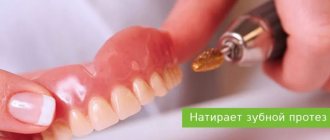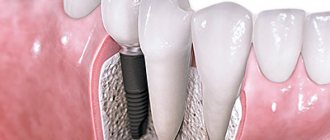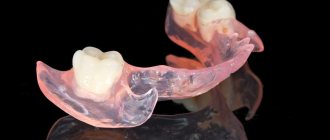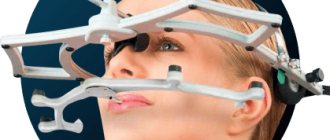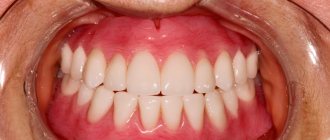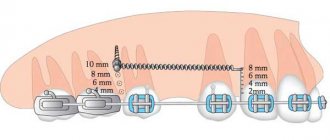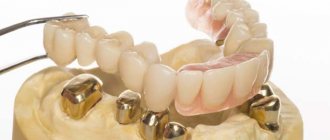Removable dentures are a common method of dental restoration in modern dentistry. Most often, removable dentures are used for dental restoration in elderly people. The method of dental prosthetics using removable dentures helps you quickly return to your previous active life without discomfort, and also restores the beauty of your smile. It will only take you a few days to get used to the dentures. We will also tell you how to speed up this process in the article. If you want to read about addiction right now, click on the link. Removable dentures fully reproduce the main function of teeth - crushing and chewing food.
Caring for removable dentures
Although a removable denture is an artificial structure, it still requires careful and high-quality care, because in fact, after installation, it becomes part of your body. Proper care of removable dentures guarantees comfortable wearing of the structure and its durability.
There are rules that must be followed for those who want to keep their dentures for a long time.
Rules for caring for removable dentures
After each meal, try to remove the denture to rinse it under running water. This not only ensures the comfort of wearing the denture (small particles of food remaining under the structure are very disturbing), but also guarantees the protection of the gums from the effects of pathogenic bacteria. Those pieces of food that remain under dentures are a breeding ground for microbes that can cause gum disease.
Cleaning a removable denture should be done with a soft-bristled toothbrush so as not to damage the integrity of the structure. When cleaning, special attention should be paid to: the part that is in direct contact with the gum, areas near the salivary gland canals, the front part of the lower jaw dentures and the side part of the upper jaw denture.
You can use regular toothpastes to clean your dentures. But try not to clean your dentures with whitening toothpaste. Such pastes contain strong abrasive substances that can damage the material of the structure.
Before going to bed, after the adaptation period has passed, the denture should either be left in the mouth or removed. You should clean your denture not only after each meal, but also before going to bed. It is necessary to store dentures at night in purified water (even boiled water will do) or a special composition that you can buy in pharmacies.
In case of breathing problems, sleep disorders, snoring and teeth grinding, dentures must be removed at night. If you are absolutely sure that you have one of the listed diseases, tell your dentist about it at your appointment. You will be recommended a treatment that will relieve you of your sleep problems. If you are concerned about your prosthesis or are just about to start prosthetics, we suggest you contact our Dentistry clinic on Shchelkovskaya Diamed. Convenient location, attentive doctors, and extensive experience in working with removable dentures guarantee you the accuracy of the work performed and the comfort of wearing a removable denture. You can sign up for the clinic by calling 8 or using the online registration form.
Eating with removable dentures
Caring for removable dentures involves regular disinfection. The prosthesis is placed in water in which a special disinfectant capsule is dissolved. It is enough to place the prosthesis in the prepared solution for only fifteen minutes.
To maintain the beautiful appearance of the prosthesis for as long as possible, try to consume less products with dyes, as well as tea, coffee, wine and other alcohol. Smoking also significantly increases the likelihood of darkening and discoloration of the denture. Avoid getting sticky food (taffy, chewing gum) on your dentures. Crackers, hard nuts, ice - all this should not be chewed if you do not want the prosthesis or artificial tooth to break.
How to care at home
The products used to clean your home can achieve good results. The most important thing is to regularly care for your dentures at home. But professional cleaning should be an equally significant addition to home care.
When cleaning them at home you need to use:
- with a soft toothbrush (carefully treat areas of contact with the gums);
- non-abrasive toothpaste (you can use gentle children's toothpaste);
- tablets - indicators of bacterial plaque;
- disinfectant solutions (antiseptics, rinses containing chlorhexidine, special tablets).
Treatments using vinegar or lemon are especially popular. Frequent cleaning with vinegar is not advisable, as it negatively affects the strength of the teeth. You can use this method sometimes by placing the structure in vinegar for 2 hours.
It is safer to mix a quarter of a lemon with toothpaste or powder and apply the mixture and leave for 20 minutes. Then rinse with running water. Some people try to use baking soda, but doctors say there are no results from such cleansing, despite the prevailing opinion about its effectiveness.
Getting used to removable dentures
As a rule, getting used to removable dentures takes some time. But after the “grinding in” period, a person already perceives the prosthesis as an integral and irreplaceable part of his body.
How long does it take to get used to dentures?
On average, the period of adaptation to dentures for a patient lasts thirty days. At first, dentures feel like a foreign body in the oral cavity, but this is quite natural, because a removable denture is an orthodontic structure. At first, removable dentures may even impair diction. This is especially difficult for people who, due to duty or other life circumstances, regularly communicate in foreign languages. But soon you will get used to it and your speech will be restored.
The presence of an orthodontic structure in the oral cavity initially disrupts the process of salivation and prevents a person from objectively assessing the taste and temperature properties of the food consumed. Also, during meals in the first month of wearing removable dentures, it may be difficult for a person to bite off solid food and chew a piece.
Caring for removable dentures also takes some getting used to. To help you remember, try posting reminders of what needs to be done. Over the course of some time, caring for removable dentures will become automatic.
But there is no need to worry and worry in all of the above cases. Typically, the patient’s symptoms of getting used to a removable denture disappear during the first week of wearing. Within a month, you will physically stop noticing the removable denture and will not consider it a foreign body. Moreover, most patients note that after an adjustment period they feel more comfortable with dentures in the mouth than without them.
How to quickly get used to removable dentures
The main condition for quickly getting used to removable dentures is their constant use despite some discomfort. It's worth it - it's better to wait one week and then enjoy a quality and comfortable life. There are several recommendations and tricks that will help the body go through the adaptation period faster.
During the adjustment period, before placing the denture in the oral cavity, moisten it with water or apply a special fixative to its surface. Practice putting on and taking off removable dentures first, so that later this action becomes mechanical. If you start to feel nauseous, suck on a small piece of candy by pressing your tongue against the roof of your mouth.
For up to two weeks, when you get used to the dentures, do not take them off even at night. They should only be removed to clean the mouth and the denture itself. Reading aloud for two hours in a quiet environment will again help “tune” your diction. This exercise restores the articulation of sounds in five to six days. Rinse your mouth with warm water about eight times a day and drink hot tea more often. Cut foods into small pieces before eating. It is better to chew food with your lateral teeth, both left and right at once. Eat more vegetables and fruits.
Removable dentures without a palate that do not need to be removed at night
Today we have new products in the field of prosthetics. For example, removable dentures without a palate are now popular, which do not need to be removed at night. The part that rests on the roof of your mouth can cause a gag reflex and cause general discomfort. Dentures with a free palate are much nicer.
Modern manufacturing technologies make it possible to create designs that do not need to be removed at night. However, do not forget about oral hygiene: you need to regularly remove dentures for cleaning.
Features of wearing removable dentures
Removable dentures have some features. When designing removable dentures, it is impossible to take into account several factors that can only appear while wearing the dentures. This is the degree of pressure of the prosthesis on the gum and the degree of fixation of the prosthesis. It happens that at first patients are concerned about pain when wearing dentures.
Correction of removable dentures
Correction of removable dentures - grinding of the structure in places of contact with the oral mucosa - is carried out the next day after installation of the denture. During the first two weeks of wearing the structure, several adjustments to the prosthesis may be required.
The correction procedure is carried out in the dental office by the attending dentist. Before visiting a doctor to have your denture adjusted, be sure to wear it and walk around with it for at least three to four hours. Also, do not carry out self-correction of a removable denture using improvised tools. At best, this will completely disrupt the fixation of the prosthesis, and at worst, it will lead to a breakdown, after which it is impossible to restore the structure - you will have to make a new one.
If the denture rubs the gum
Some patients, when wearing dentures for the first time, complain that the structure rubs their gums. This is the result of the oral cavity “getting used to” a foreign object. In order to get rid of unpleasant sensations, consult a doctor - he will correct the prosthesis. Don't tolerate discomfort. In the place where the prosthesis rubs, an inflammatory process can form, and healing due to constant friction is almost impossible. If you cannot get to the orthopedist who installed the prosthesis for you, you can turn to us for a service - at the clinic on Shchelkovskaya. An experienced specialist will see you and help you adjust the prosthesis so that nothing bothers you. Just call 8 (495) 033-00-63 or leave your details in the registration form on our website.
Fixation of the prosthesis
The anatomical features of the jaw structure in some people create obstacles to comfortable wearing of dentures. In such cases, you can use a special fixing gel, which is applied in a thin line to the prosthesis. This gel is completely invisible to humans and is absolutely safe. It is better to choose a gel in consultation with your doctor.
Broken prosthesis
During the use of prostheses, due to various factors, the prosthesis may break, as well as cracks and chips. In such cases, you must immediately consult a doctor to repair the structure. The repair period for a prosthesis is up to three days; making a new design (if the old one cannot be corrected) takes a week.
Service life of removable dentures
If you follow the rules and provide regular care for your removable dentures, the design will last you a long time. The minimum service life of prostheses is three years. The production of new prostheses after a certain period of time is extremely necessary - wearing outdated structures causes bone tissue atrophy and “sagging” of the lower part of the face.
When wearing removable dentures, it is important to visit a dentist at least twice a year. The doctor relines the prosthesis - restoring a tight fit of the prosthesis to the jaw. The doctor also examines the general condition of the oral cavity, which allows timely detection and treatment of inflammatory processes.
If you feel severe discomfort while wearing removable dentures, dry mouth, pain, then contact your dentist as soon as possible - he will help identify the causes of symptoms and carry out the necessary restorative procedures.
